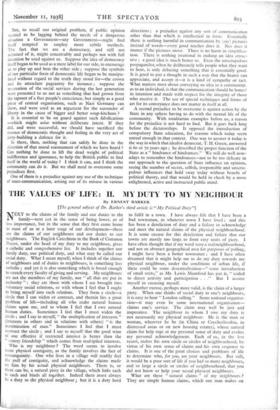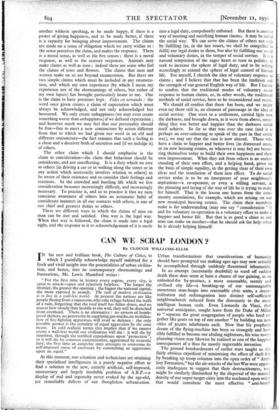THE VALUES OF LIFE: II. MY DUTY TO MY NEIGHBOUR
By ERNEST BARKER
[The general subject of Dr. Barker's third article is My Political Duty"] NEXT to the claims of the family and our duties to the family—next not in the sense of being lower, or of less importance, but in the sense that they first come home to most of us at a later stage of our development—there are the claims of our neighbours and our duties to our neighbours. The English Catechism in the Book of Common Prayer, under the head of my duty to my neighbour, gives a catholic and comprehensive list. It includes together our family duty, our political duty, and what may be called our social duty. What I mean myself; when I think of the claims of neighbours and of duties to neighbours, is something less catholic ; and yet it is also something which is broad enough to stretch every faculty of giving and serving. My neighbours are not the members of my family, nor "all that are put in authority " : they are those with whom I am brought into voluntary social relations, or with whom I feel that I ought to bring myself into such relations. They form a circle—a circle that I can widen or contract, and therein lies a great problem of life—including all who make natural human claims upon me, and to whom I feel that I owe natural human duties. Sometimes I feel that I must widen the circle ; and I say to myself, " the multiplication of interests" (interests in others and in relations with others) "is the maximisation of man." Sometimes I feel that I must contract the circle ; and I say to myself that the good wine of one effective if restricted interest is better than the 4‘ watery friendship" which comes from multiplied interests.
Who is my neighbour ? The word seems to involve some physical contiguity, as the family involves the fact of consanguinity. One who lives in a village will readily feel the pull of contiguity, and acknowledge the claims made on him by his actual physical neighbours. There is, or there can be, a natural piety in the village, which links each to each and binds all together. Indeed there .must always he a duty to the physical neighbour ; but it is a duty hard to fulfil in a town. I have always felt that I have been a bad townsman, in whatever town I have lived ; and this has been a dereliction of duty and a failure to acknowledge and meet the natural claims of the physical neighbourhood. It is some excuse for this dereliction and failure that our towns are mostly too large, to form easy units of piety. I have often thought that if my ward were a real neighbourhood, and not an abstract geographical area for purposes of polling, I might have been a better townsman ; and I have often dreamed that it might help me to do my duty towards my physical neighbour, under the conditions of urban life, if there could be some decentralisation—" some introduction of small units," as Mr. Lewis Mumford has put it, "scaled to direct activity and participation . . ." But I accuse myself in excusing myself.
Another excuse, perhaps more valid, is the claim of a larger piety. When one thinks of social duty to one's neighbours, it is easy to hear " London calling." Some national organisa- tion—it may even be some international organisation— claims one's service. The claim may well be just and imperative. The neighbour to whom I owe my duty is not necessarily my physical neighbour. He is the man or woman, wherever he be (in China or Czechoslovakia, in distressed areas or on new housing estates), whose natural claim for help tugs at my personal sense of duty and evokes my personal acknowledgement. Each of us, in the last resort, makes his own circle or circles of neighbourhood, by virtue of his own sense of claims and his own response to claims. It is one of the great choices and problems of life to determine who, for you, are your neighbours. But still, it would be a poor sort of life if you had so many neighbours, and so large a circle or circles of neighbourhood, that you did not know or help your actual physical neighbours.
What are these "natural claims" of my neighbours ? They are simple human claims, which one man makes on another without speaking, to be made happy, if there is a power of giving happiness, and to be made better, if there is a capacity for bringing about improvement. The claims are made on a sense of obligation which we carry within us : the sense perceives the claim, and makes the response. There is a moral sense, as well as the five senses ; there is a moral response, as well as the sensory responses. Animals may make claims as well as men ; indeed there are some who feel the claims of trees and flowers. The claims that men and women make on us are beyond enumeration. But there are two simple claims which must be included in any enumera- tion, and which my own experience (by which I mean my experience not of the shortcomings of others, but rather of my own lapses) has brought particularly home to me. One is the claim to have promises kept. Fides est servanda : the word once given creates a claim of expectation which must always be acknowledged, and not only acknowledged but honoured. We only create unhappiness (we may even create something worse than unhappiness) if we defraud expectation ; and however much we may feel that our personality should be free—free to meet a new conjuncture by action different from that to which we had given our word in an old and different conjuncture—the fact remains that such a feeling is a cheat and a deceiver both of ourselves and (if we indulge it) of others.
The other claim which I should emphasise is the claim to consideration—the claim that behaviour should be considerate, and not unreflecting. It is a duty which we owe to others (in driving a car or in walking along the street or in any action which necessarily involves relation to others) to be aware of their existence and to consider their feelings and reactions. In the crowded and hustling life which we live consideration becomes increasingly difficult, and increasingly necessary. To practise it, and so to practise it that we turn conscious awareness of others into an automatic habit of considerate manners in all our contacts with others, is one of our chief and greatest duties to others.
There are different ways in which the claims of man on man can be met and satisfied. One way is the legal way. When that way is followed, the claim is made into a legal right, and the response to it or acknowledgement of it is made into a legal duty, compulsorily enforced. But there is another way of meeting and satisfying human claims; it may be called the social way. We can serve the claims of others not only by fulfilling (as, in the last resort, we shall be compelled to fulfil) our legal duties to them, but also by fulfilling our social and voluntary duties, in the temper of social service. It Is a natural temptation of the eager heart to turn to politics, to seek to increase the sphere of legal duty, and to be willing accordingly to extend the sphere of legal control of human life. For myself, I cherish the idea of voluntary response to claims ; and I believe that that has been the tradition and the strength of our general English way of life. But I hasten to confess that the traditional modes of voluntary social response to human claims, or, in other words, the traditional methods of social service, have to be reconsidered and recast.
We should all confess that there has been, and we might even say there still is, an element of patronage in the idea of social service. One went to a settlement, carried light into the darkness, and brought down, as it were from above, some- thing that was better and happier than the darkness could itself achieve. So far as that was ever the case (and it is perhaps an over-colouring to speak of the past in that crude way), we may say that the case is now altered. Those who have a claim to happier and better lives (in distressed areas, or on new housing estates, or wherever it may be) are bestir- ring themselves today to build their own happiness and their own improvement. What they ask from others is an under- standing of their own effort, and a helping hand, given on the basis of simple equality, in the getting clear of their own ideas and the translation of them into effect. To do social service today is to be an interpreter of your neighbour's aspirations—a co-operator, or even a willing servant, in the planning and laying of the way of life he is trying to make for himself. That is the lesson one learns from the com- munity associations, for example, which are arising on our new municipal housing estates. The claim their members make is for understanding (may one say "consideration " ?) and for voluntary co-operation in a voluntary effort to make a happier and better life. But that is as good a claim as one man can make on another—that he should ask for help when he is already helping himself.











































 Previous page
Previous page